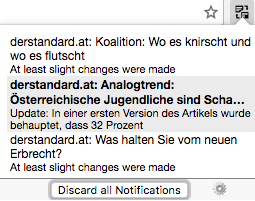Corrections in Online News
My (Markus »fin« Hametner's) Master's thesis at Vienna University of Technology
Advisor: Geraldine Fitzpatrick, Professor of Technology Design and Assessment and head of the Institute of Design and Assessment of Technology.
or
 |
 |
| Feature: Notifications on changes in news | Feature: all recent changes in the news you read |
The Study
The news is often perceived as a static medium. Online news articles, however, are often edited after publication. Some edits are minor, some add updates that happened during the day, some are complete rewrites or factual corrections.
For my master’s thesis, I am exploring how people react to being notified about changes in news articles that happened after they read them. I am aiming for a duration of 6-8 weeks for this study, and I hope you'll participate.
Privacy
Tracking what kind of news a person consumes may allow one to infer political opinions and potentially embarassing information (if the only news someone browses are celebrity sites).
The extension you'll be evaluating is designed with privacy aspects in mind: the raw browsing data never leaves your computer. The server only serves lists of all changes that happened in the past few days, and is not asked for specific changes to stories, to prevent tracking by inference.
Data Collection
The extension logs which urls you visit on a number of news sites and periodically checks for changes in their content, by getting a list of changed articles from a server maintained by me. If you agree to participate in the survey – by checking a checkbox – once a day, the following information is then submitted for further analysis:
- the number of URLs (not the actual URLs!) visited on news sites
- the number of notifications shown, per day and per “severity” of the change
- the number of notifications dismissed, per day and per “severity” of the change
- the number of notifications interacted with, per day and per “severity” of the change
This helps me analyze how my tool is being used without having to track your exact browsing habits and actions.
Every data submission is tagged with an ID that is unique to your computer and is generated when the extension is installed. This information is only logged and submitted if a checkmark is checked on the options screen – it is off by default. Next to the checkmark, you'll also find details of what will be submitted.
I'm also asking all participants to complete a survey, which asks about your age, profession, and email. You'll also be asked if you'd be available to be interviewed about your experience. The responses to the survey are not linked to the ID contained in the data submissions. They are stored independently of the logging data, using a access-protected Google Form (which means they will only be accessible to me).
Generally, the extension was created with privacy aspects in mind. However, if you want to see details about changes to a story you were notified about, the extension opens a page on one of my servers, showing the before-after view for the change.
In theory, logging visits to the server could be used to help deanonymize users. However, this is non-trivial, and logging is not enabled.
Risks to Participants
There is always a possibility of data breaches by hackers, either on the server the extension is accessing (and sending logs to), or on the user’s browser. To mitigate against this, the server software is kept up to date and every effort is made to keep the data secure.